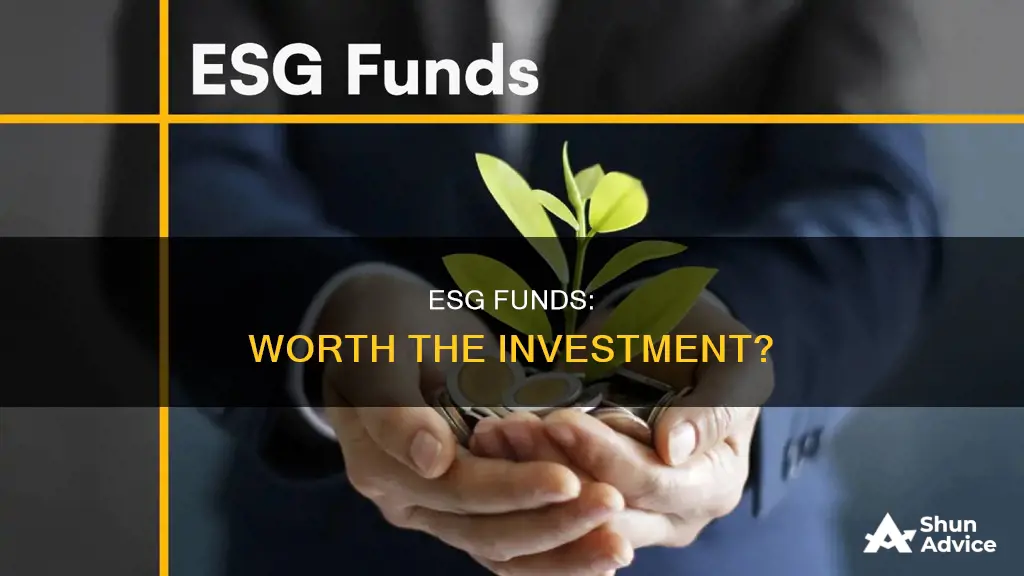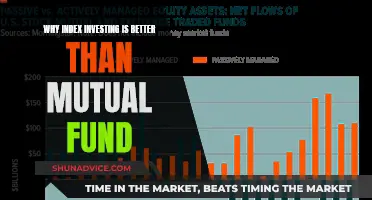
Environmental, social, and governance (ESG) investing is a way to build a more ethical investment portfolio. It is a form of sustainable investing that considers environmental, social, and governance factors to judge an investment's financial returns and its overall impact. While ESG investing has gained popularity, it is important to understand the potential benefits and risks before deciding whether to invest in ESG funds.
| Characteristics | Values |
|---|---|
| Performance | ESG funds have been found to outperform traditional funds in some cases. |
| Risk | ESG funds have been found to have a lower downside risk than traditional funds. |
| Cost | ESG funds tend to have higher fees than other funds. |
| Returns | ESG funds may not match the returns of traditional funds. |
| Historical Returns | ESG funds have a lack of historical returns, making it difficult to estimate expected returns. |
| Investor Demand | There is increasing investor demand for ESG funds, with a growing focus on social values. |
| Company Compliance | Companies are making efforts to comply with ESG standards and reporting. |
| Company Evaluation | ESG scores are used to evaluate companies and funds based on sustainability and performance. |
What You'll Learn

ESG funds' fees and returns
When considering whether to invest in ESG funds, it's important to look at the fees and potential returns.
Fees
ESG funds are often actively managed, which means they tend to have higher fees than passively managed funds. The extra cost is due to the additional work involved in researching and selecting companies that meet ESG criteria. However, as the market has embraced ESG, expense ratios have been falling.
According to YCharts, the average asset-weighted expense ratio for US equity funds marketed as ESG funds was 34 basis points at the end of August 2022. In comparison, funds with higher-than-average ESG ratings, regardless of their names, charged an average of 25 basis points, while the asset-weighted average for all US equity funds was 12 basis points.
Returns
While ESG funds have shown solid results, there is a lack of historical returns data to make long-term predictions. ESG funds are relatively new, and it's challenging to estimate expected returns based on limited actual investment data.
However, studies from JUST Capital, Arabesque Partners, and others have shown that ESG funds can match or even outperform traditional funds in terms of performance. A 2019 white paper from the Morgan Stanley Institute for Sustainable Investing compared sustainable funds and traditional funds from 2004 to 2018, finding that sustainable funds consistently showed a lower downside risk.
Additionally, ESG funds have demonstrated solid performance and resilience in both good and bad markets. For example, the Vanguard ESG U.S. Stock ETF, with nearly 1,500 holdings, has a well-diversified portfolio that meets environmental, social, and governance principles. It has outperformed its large-cap blend category average over the past two, three, and five years, while also offering a higher dividend yield.
In summary, while ESG funds may have higher fees than some other investment options, they have the potential to deliver strong returns and lower downside risks. However, the lack of long-term historical data makes it challenging to predict future performance accurately.
Bond Funds: Worth Investing or Not?
You may want to see also

ESG vs SRI and CSR
Should I Invest in ESG Funds?
There is a growing demand for ESG (Environmental, Social, and Governance) investing, with 66% of millennials and nearly half of Gen Xers expressing interest in having money in ESG investments. ESG funds offer access to a group of stocks that pass certain environmental or other criteria. However, they also have some drawbacks, such as higher fees and a lack of historical returns, which may impact overall profitability.
ESG vs. SRI and CSR
ESG, SRI (Socially Responsible Investing), and CSR (Corporate Social Responsibility) are terms often used interchangeably, but they have distinct meanings and applications.
ESG
ESG evaluates a company's environmental, social, and governance practices alongside traditional financial measures. It provides an objective measure of a company's behaviours and risks in these areas, which can impact its financial performance. The evaluation considers a company's direct and indirect environmental impact, its impact on its workforce and communities, and its leadership structure and ethical policies.
SRI
SRI involves choosing or excluding investments based on specific ethical criteria. It is often influenced by an investor's personal values and can be subjective. SRI may involve screening out companies associated with weapons, alcohol, tobacco, human rights violations, or environmental damage. It can also include seeking out companies with strong charitable activity or those that donate a high proportion of profits to charity.
CSR
CSR refers to the voluntary initiatives taken by individual companies to improve their impact on society. This can include reducing environmental impact, promoting diversity, or supporting charitable causes. CSR is typically a company-led initiative, whereas ESG and SRI are investment strategies driven by investors.
ESG, SRI, and CSR each play a role in the broader movement towards responsible and ethical investing. While they have some overlap, they represent different approaches and strategies. ESG provides an objective evaluation of a company's environmental, social, and governance practices, while SRI allows investors to screen investments based on their personal ethical criteria. CSR, on the other hand, is a company-led initiative to improve societal impact. These strategies can be used in combination to optimise investments in socially responsible organisations.
Invest Like Harvard: Accessing the Endowment Fund
You may want to see also

How to identify greenwashing
Greenwashing is a marketing tactic used by companies to lure in environmentally conscious customers, despite their products or services not being sustainable. It involves providing false or misleading information about their practices. For example, a manufacturer of disposable consumer goods might highlight their use of recycled raw materials in a small minority of their products.
The rise in ESG investing has attracted less conscientious actors aiming to profit from the trend, and greenwashing has become a big problem in this space. Studies have shown that more and more ESG funds include companies that are far from paragons of social and environmental responsibility.
- Be aware of the risk – The first step is to be aware of the risk of greenwashing. Know that it exists and be vigilant when evaluating investment options.
- Do your research – Don't rely solely on ESG scores and ratings. Research companies or funds individually, even those with strong ESG ratings, to ensure they are not greenwashing. This can include reading company ESG disclosures and sustainability reports, talking to employees, and reading reviews and articles about the company.
- Use multiple ESG scoring platforms – To reduce the risk of selecting the wrong investments, use multiple ESG scoring platforms such as Bloomberg ESG ratings, CDP (formerly Carbon Disclosure Project) scores, Refinitiv or S&P Global ESG scores, and FTSE Russell's ESG data model. Select only companies that have solid ratings on all the platforms.
- Seek advice from a specialist – If you're unsure, consider seeking advice from a financial advisor that specializes in ESG investing. Green America, a nonprofit organization that advocates for environmental and social economic justice, offers a list of financial advisors that focus on helping people align their investments with their values.
- Look out for generic ESG metrics – Many ESG scoring sites use generic ESG metrics. If your values are more specific, you'll need to select companies that do well based on those particular values. For example, CDP scores highlight specific environmental impacts of the companies they evaluate.
- Check for regulatory compliance – Regulatory agencies in the US and Europe are cracking down on companies that use ESG as a marketing ploy. The US Securities and Exchange Commission (SEC) has created an ESG enforcement task force to identify violations in disclosure and compliance related to ESG funds. The European Commission (EC) is also seeking to strengthen national authorities' ability to deal with greenwashing.
By following these steps, you can help identify greenwashing and make more informed investment decisions that align with your values and goals.
Equity Income Funds: Smart Investment for Steady Returns
You may want to see also

ESG scores and ratings
ESG scores are an objective evaluation of a company, fund, or security's performance against Environmental, Social, and Governance (ESG) criteria. The specific criteria vary between different rating platforms but fall within one or more of the E, S, or G categories.
ESG scoring systems are either industry-specific or industry-agnostic. Industry-specific systems assess issues deemed material to that industry, while industry-agnostic systems incorporate widely accepted factors like climate change, diversity, equity, and human rights.
Rating platforms determine a weighting for each criterion, then assess a company's performance against them. The final ESG score is typically a sum of the criteria ratings and their weightings.
Scores are used differently by investors and employees, and platforms have evolved to reflect this. For investors, ESG scores can be used to supplement financial analysis and gain a broader view of a company's long-term potential, especially when used alongside traditional investment processes.
Who Assigns ESG Scores?
ESG scores can be assigned by external or internal stakeholders. External stakeholders include finance and investment firms, consulting groups, standard-setting bodies, NGOs, and government agencies. Examples include ISS, CDP (formerly the Carbon Disclosure Project), MSCI, Sustainalytics, and S&P TruCost.
Internal ESG scores, or scorecards, are used to gauge performance within an organisation. Many entities are creating in-house scoring systems to monitor and report on their ESG performance.
ESG scoring systems are designed for different use cases and stakeholders. For example, the CDP is an NGO scoring system for corporate performance on environmental issues, which is popular with asset managers. Just Capital is a consumer-focused NGO scoring system that assesses corporate performance on stakeholder issues, which may be leveraged by consumers or prospective employees.
Challenges and Limitations of ESG Scores
While ESG scores are a useful tool, there are some challenges and limitations to consider. One is the issue of "greenwashing", where companies may overrate their environmental standards to deceive stakeholders. Even ESG funds can be deceived by such claims, so it is important for investors to conduct their own research as well.
Another challenge is the lack of standardisation across different scoring platforms, which can make it difficult to compare companies' ESG performance. Additionally, the weightings and criteria used to calculate scores may not always be clear, making it hard to interpret the results meaningfully.
Despite these challenges, ESG scores remain a valuable tool for investors to evaluate companies' ESG compliance and performance, especially when used in conjunction with other research and due diligence.
A Beginner's Guide to Mutual Fund Investing in Europe
You may want to see also

ESG investing: DIY or robo-advisor?
ESG (Environmental, Social, and Governance) investing is a type of sustainable, responsible, and impact investing strategy that aims to generate high long-term returns while creating positive societal outcomes. As interest in ESG investing grows, investors are increasingly turning to financial advisors and robo-advisors to navigate this complex landscape. But is a robo-advisor the right choice for ESG investing, or should you go the DIY route? Let's explore the advantages and disadvantages of both options to help you decide.
DIY ESG Investing
If you choose to take a DIY approach to ESG investing, you will be responsible for selecting and managing your own investments. This option may appeal to those who want complete control over their investment decisions and are willing to put in the time and effort to research and monitor their portfolio. Here are some key considerations for DIY ESG investors:
- Identifying your values and priorities: The first step in ESG investing is to identify your passions and priorities. Are you primarily concerned with environmental issues, social justice, corporate governance, or a combination of these factors? Knowing what matters to you will guide your investment choices.
- Conducting thorough research: When investing in individual stocks and funds, it's crucial to conduct extensive research to ensure that companies' ESG claims are legitimate and not just "greenwashing." This involves reviewing ESG scores, reading disclosures and sustainability reports, and even talking to company employees.
- Higher fees: In the past, ESG analysis often required investing in actively managed funds, resulting in higher fees. While the market has evolved to offer more options, ESG funds may still lag in terms of costs compared to traditional index funds or ETFs.
- Lack of historical returns: ESG investing is a relatively new concept, and as a result, there is limited long-term data to predict future returns accurately. This can make it challenging to estimate expected returns, especially when planning for a long-term investment horizon.
Robo-Advisors for ESG Investing
Robo-advisors are digital investment platforms that use algorithms to manage investments on your behalf based on your goals and risk tolerance. Here are some key advantages and considerations of using a robo-advisor for ESG investing:
- Professional investment management: Robo-advisors provide automated investment management services, taking the burden of research and portfolio construction off your shoulders. They use modern portfolio theory (MPT) to create diversified portfolios that align with your values and financial goals.
- Low fees: Robo-advisors typically charge lower fees than traditional financial advisors, making them a more cost-effective option for many investors. Some robo-advisors, like M1 Finance, even offer free investment management.
- Customisation options: While robo-advisors use algorithms to create portfolios, many also allow for customisation. You can choose from pre-built portfolios or select individual stocks and funds to create a portfolio that aligns with your specific values and goals.
- Goal planning and tax optimisation: In addition to investment management, robo-advisors often offer comprehensive goal planning tools and tax-loss harvesting strategies to help you make informed decisions and optimise your portfolio's performance.
- Limited human interaction: While some robo-advisors provide access to human financial advisors, the level of personal interaction is generally lower compared to working with a traditional advisor. If you value a relationship-based approach, a human advisor may be a better fit.
- Varying ESG offerings: Not all robo-advisors offer the same level of ESG investing options. Some may have a more limited selection of ESG funds, while others specialise exclusively in socially responsible investing. Be sure to research the available platforms to find one that aligns with your specific ESG criteria.
So, Which Option Is Right for You?
The decision to use a robo-advisor or take a DIY approach to ESG investing depends on your individual needs and preferences. If you're comfortable with technology, appreciate the convenience of automation, and want to benefit from professional investment management at a lower cost, a robo-advisor may be a good choice. On the other hand, if you prefer to have more direct control over your investments, are willing to put in the necessary research time, and don't mind potentially higher fees, the DIY route could be a better fit. Ultimately, it's essential to understand your investment goals, risk tolerance, and the level of involvement you want in managing your portfolio.
Navigating Investment Funds: Knowing When to Change for Success
You may want to see also
Frequently asked questions
ESG stands for Environmental, Social, and Governance factors, which are used to evaluate a company or investment's sustainability.
ESG funds have the potential for high returns and have been found to consistently show lower downside risks than traditional funds. They also allow investors to align their morals with their wallets.
First, decide whether you want to build your own ESG investment portfolio or get help from a robo-advisor. Then, identify your own ESG criteria and choose ESG investments that align with your values and goals.







